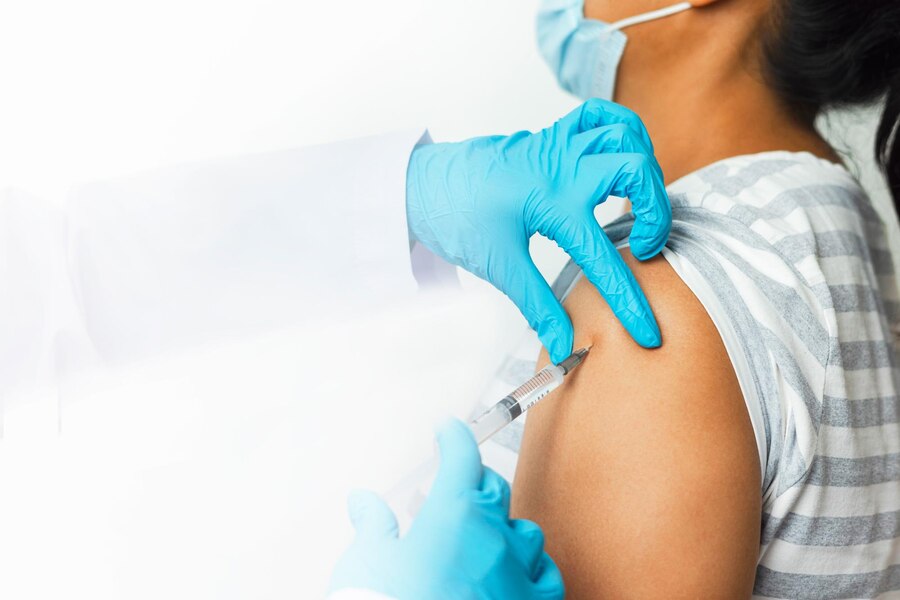In the ongoing battle against infectious diseases, vaccines stand as one of the most powerful tools at our disposal. They have been pivotal in controlling and even eradicating deadly illnesses throughout history. However, with the emergence of new vaccines and the rapid spread of information through various media channels, understanding their efficacy has become a subject of intense scrutiny and debate. In this blog, we delve into the intricate landscape of vaccine efficacy, separating facts from myths to comprehensively understand their role in public health.
Vaccine efficacy measures how well a vaccine prevents disease under ideal and controlled conditions. It’s essential to differentiate between efficacy and effectiveness, where efficacy refers to results observed in controlled clinical trials, and effectiveness reflects real-world outcomes. While high efficacy rates are crucial indicators of a vaccine’s potential to combat a specific disease, factors such as vaccine hesitancy, accessibility, and adherence to vaccination schedules significantly influence their effectiveness.
Despite the overwhelming scientific consensus on the safety and efficacy of vaccines, misinformation and myths continue to circulate, fueling skepticism and distrust. Debunking these myths requires clear communication and transparent dissemination of accurate information backed by scientific evidence. Understanding the mechanisms behind vaccine development and how they stimulate the immune system can help debunk common misconceptions and address concerns regarding their safety and efficacy.
Moreover, ongoing research and surveillance are essential to monitor vaccine efficacy over time and identify any potential waning immunity or emerging variants that might affect their effectiveness. This dynamic nature underscores the need for continuous evaluation and adaptation of vaccination strategies to ensure optimal protection against infectious diseases. Collaborative efforts between researchers, healthcare professionals, policymakers, and the public are crucial in maintaining high vaccination rates and preventing outbreaks.

Understanding Vaccine Efficacy
Vaccine efficacy is a critical concept in public health, representing the effectiveness of a vaccine in preventing disease under controlled conditions. It’s essential to distinguish between efficacy and effectiveness; while efficacy is measured in clinical trials, effectiveness reflects real-world outcomes. Understanding vaccine efficacy involves examining factors such as the type of vaccine, the target pathogen, and the population being vaccinated. By comprehending these factors, we can better interpret vaccine data and make informed decisions about their use in disease prevention strategies.
Debunking Common Myths
Misinformation and myths surrounding vaccines have increased in recent years, leading to vaccine hesitancy and distrust. Debunking these myths is crucial for promoting vaccine acceptance and public health. Common myths include vaccine safety, efficacy, and alleged adverse effects. Through education, clear communication, and dissemination of evidence-based information, we can address these misconceptions and build trust in vaccination as a vital tool for disease prevention.
Importance of Clinical Trials
Clinical trials are fundamental in assessing the safety and efficacy of vaccines before they are approved for public use. These trials involve rigorous testing phases, including preclinical studies, Phase I, II, and III trials, and post-marketing surveillance. The data gathered from these trials provide crucial insights into a vaccine’s performance, helping regulatory agencies make informed decisions about its approval and usage. Understanding the significance of clinical trials is essential for appreciating the scientific basis behind vaccine recommendations.
- Safety Evaluation: Clinical trials provide a controlled environment to assess the safety profile of vaccines, identify potential adverse reactions, ensure that vaccines meet rigorous safety standards before widespread use, and safeguard public health.
- Efficacy Assessment: Conducting clinical trials allows researchers to evaluate the effectiveness of vaccines in preventing disease under controlled conditions, providing valuable data on vaccine efficacy rates and informing public health policies and recommendations.
- Determining Optimal Dosing and Schedules: Clinical trials help determine the optimal dosing regimens and vaccination schedules for different populations, ensuring maximal immune response and long-term protection against targeted pathogens and contributing to developing effective vaccination strategies.
Real-World Effectiveness
While clinical trials provide valuable data on vaccine efficacy, real-world effectiveness can differ due to population demographics, vaccine coverage rates, and the prevalence of circulating strains. Assessing real-world effectiveness requires monitoring vaccine outcomes in diverse populations over time. Studies evaluating vaccine impact on disease incidence, hospitalization rates, and mortality rates provide valuable insights into their effectiveness in preventing illness and reducing disease burden.
Factors Influencing Efficacy
Several factors can influence vaccine efficacy, including the type of vaccine, the dosing schedule, and individual characteristics such as age and immune status. Additionally, the emergence of new variants may impact vaccine effectiveness, highlighting the importance of ongoing surveillance and adaptation of vaccination strategies. Understanding these factors enables healthcare professionals to tailor vaccination recommendations to specific populations and mitigate potential challenges in achieving optimal vaccine coverage.
Addressing Vaccine Hesitancy
Vaccine hesitancy, fueled by misinformation, distrust, and cultural beliefs, poses a significant challenge to public health efforts. Addressing vaccine hesitancy requires a multifaceted approach, including proactive communication, community engagement, and building trust in healthcare systems. Healthcare providers play a crucial role in addressing concerns, providing accurate information, and addressing misconceptions to improve vaccine acceptance and uptake.
Clear Communication Strategies
Effective communication is essential for promoting vaccine acceptance and dispelling myths. Clear and transparent communication about vaccine safety, efficacy, and the importance of vaccination in preventing disease is critical to building public trust. Tailoring messages to different populations, addressing concerns empathetically, and leveraging trusted messengers can enhance the effectiveness of communication strategies and promote vaccine confidence.
Immune System Response
Understanding how vaccines interact with the immune system is crucial for evaluating their efficacy and safety. Vaccines stimulate the immune system to produce an immune response, including antibodies and memory cells. This immune response protects against future encounters with the target pathogen. Different types of vaccines elicit varying immune responses, influencing their efficacy and duration of protection.
Surveillance and Monitoring
Continuous surveillance and vaccine safety and effectiveness monitoring are essential components of public health programs. Monitoring adverse events following vaccination allows for early detection of potential safety concerns, enabling prompt intervention and mitigation strategies. Surveillance systems also track vaccine coverage rates and disease incidence, providing valuable data for evaluating vaccine impact and guiding immunization policies.
Adapting Vaccination Strategies
Vaccination strategies must be adaptable to changing epidemiological trends, emerging infectious diseases, and evolving vaccine technologies. Flexibility in vaccine delivery, such as implementing booster doses or modifying vaccination schedules, may be necessary to maintain immunity levels and prevent disease resurgence. Collaborative efforts between public health authorities, policymakers, and healthcare providers are essential for implementing timely and effective vaccination strategies.
- Flexible Delivery Methods: Implementing diverse vaccination delivery methods tailored to community needs and infrastructure capabilities enhances accessibility and coverage rates.
- Targeted Outreach Programs: Designing targeted outreach programs to reach underserved populations, including mobile vaccination clinics and community-based initiatives, improves vaccine access and acceptance.
- Continuous Surveillance and Evaluation: Regularly monitoring vaccine effectiveness, coverage rates, and disease trends allows for timely adjustments to vaccination strategies to address emerging challenges and maintain immunity levels.
- Integration of Technology: Leveraging technology such as vaccine registries, reminder systems, and telehealth platforms facilitates efficient vaccine distribution, monitoring, and communication with individuals regarding vaccination schedules and safety information.
Collaborative Efforts Needed
Addressing global health challenges such as vaccine-preventable diseases requires collaboration and coordination among stakeholders at local, national, and international levels. Multidisciplinary approaches involving governments, non-governmental organizations, healthcare providers, researchers, and communities are essential for achieving equitable access to vaccines, promoting vaccine acceptance, and controlling disease transmission.
Trust and Transparency
Building trust and fostering transparency are fundamental to successful vaccination programs. Open communication, accountability, and respecting individual autonomy are critical principles in promoting vaccine confidence. Transparent reporting of vaccine safety data, adverse events, and decision-making processes enhances public trust and facilitates informed decision-making regarding vaccination.
Empowering Informed Decisions
Empowering individuals to make informed decisions about vaccination involves providing access to accurate information, addressing concerns, and promoting critical thinking skills. Encouraging open dialogue, addressing misconceptions, and respecting diverse perspectives can enhance vaccine acceptance and uptake. Informed decision-making empowers individuals to protect themselves and their communities from vaccine-preventable diseases.
Role in Public Health
Vaccines play a crucial role in public health by preventing illness, reducing disease burden, and controlling and eliminating infectious diseases. Vaccination programs have led to significant reductions in morbidity and mortality from vaccine-preventable diseases worldwide. Investing in vaccination infrastructure, promoting vaccine equity, and strengthening immunization systems are essential for achieving global health goals.

Future Of Vaccine Development
The future of vaccine development holds promise for innovative technologies, improved vaccine delivery platforms, and enhanced vaccine efficacy and safety profiles. Advances in mRNA vaccines, recombinant DNA technology, and vaccine adjuvants offer opportunities for developing novel vaccines against a wide range of pathogens. Continued investment in research and development, regulatory science, and global collaboration will shape the future landscape of vaccines and their impact on public health.
Understanding vaccine efficacy and addressing common myths is essential to promoting vaccine acceptance and ensuring public health. By debunking misinformation, fostering trust, and promoting transparent communication, we can empower individuals to make informed decisions about vaccination. Collaborative efforts between healthcare providers, policymakers, researchers, and communities are crucial for implementing effective vaccination strategies and achieving equitable vaccine access worldwide.
At Lotus Healthcare and Aesthetics, our mission is to revolutionize the traditional approach to health and beauty. We strive to provide a sanctuary where the convergence of advanced medical expertise and rejuvenating aesthetics becomes the cornerstone of holistic wellness. Join us in our commitment to promoting vaccination as a vital aspect of overall health and well-being.
Contact us at Lotushealthcare01@gmail.com or (850) 252-6161 for inquiries. Let’s collaborate to support evidence-based vaccination efforts, foster trust in healthcare systems, and contribute to a healthier, more vibrant future for all. Together, we can make a difference in safeguarding our communities and transforming lives through holistic wellness at Lotus Healthcare and Aesthetics.



